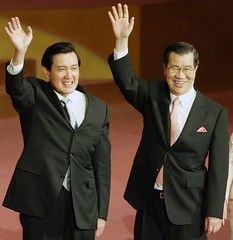By Rupert Hammond Chambers, President, US-Taiwan Business Council

For an Asian Tiger such as Taiwan it may seem ridiculous to suggest that the past two months have been the most exciting in Taiwan’s economic history since the 1950s – but that is the case. Taiwan is on a roll and there’s no reason to believe that will stop in the next 20 months.
This summer, Taiwan signed an Economic Cooperation Framework Agreement (ECFA) with China which when completed several years from now will represent a fully comprehensive Free Trade Agreement (FTA). This agreement seeks to normalize and then liberalize a troubled economic history with benefits not just to Taiwan and Chinese companies, but to the many global businesses whose interests straddle the Taiwan Strait.
The ECFA also gives Taiwan a significant leg up in its ongoing competition with its principal competitor, South Korea. The South Korean press has been filled with analysis on the implications of ECFA for Korean interests in China. They take a grim view of the impact this deal will have on their equities, and it suggest it may spur their own attempts to
commensurate a trade deal with China. In the meantime, Taiwan has a clear advantage over its main competitor.
Then in August Singapore and the Philippines both announced their intentions to explore FTA agreements with Taiwan, hinting at eventual linkage of ECFA to the ASEAN Free Trade Agreement (AFTA). This fits with President Ma’s stated dual goals of using ECFA both to normalize trade with China – smooth ties – and to crack open the nation’s trade isolation and get Taiwan into the region’s big game. Taiwan will reap commercial benefits from these deals and Ma will reap political benefits, too. Taiwan has feared being isolated as discussions about new regional architecture take place emphasizing the East Asia Summit (EAS) and the Transpacific Partnership (TPP). It is not yet party to either of these groupings.
It is also worth noting than an ongoing series of FTA negotiations provides Taiwan increased international space – an important issue for Taiwanese citizens. Taiw
an’s government officials will have a myriad of new reasons to interact with their regional counterparts and this exposure and experience is most welcome. It also plays to Beijing’s policy of seeking ways to demonstrate magna
nimity toward Taiwan’s people without compromising its policy on sovereignty.
Taiwan isn’t done yet. There is room for Taiwan to explore several additional deals with ASEAN countries. They will not look at Japan, Australia, the EU and the US yet but seek some momentum with smaller regional trading partners before taking larger steps with the world’s most dominant traders. This approach will allow Beijing to gain confidence that this process will not infringe on its one-China principle and its interpretation of Taiwan’s global position.
Malaysia, Thailand, Indonesia and Vietnam are all candidates for Taiwan. Vietnam may be the most intriguing as doing business there is perceive
d as extremely challenging by Taiwanese companies. However, these firms have been attracted by Vietnam’s size, low labor costs, proximity and aggressive growth patterns. They have made huge investments in infrastructure, petrochemicals and manufacturing in Vietnam and would like to do a great deal more. An FTA would provide the basis for expanding commerce and strengthening relations with an emerging Southeast Asian power. However, given China-Vietnam tensions of late around South China Sea disputes, Beijing may blackball that ASEAN nation initially and put it into the second wave of potential partners.
President Ma may have up to four ongoing FTA negotiations by the middle of 2011. Taipei and Beijing will remain focused on consolidating ECFA and Taiwan in completing the first wave of FTAs with ASEAN countries. If Ma wins reelection in 2012, it is reasonable to argue that the bar will be set higher and Taiwan will look to actively engage larger countries such as Australia, Japan, and the EU. If Ma losses all bets are off – it is simply unclear how Beijing will respond to a return to Democratic Progressive Party (DPP) power.
It would of course be wonderful to put the US at the top of Taiwan’s list, but in the absence of a trade liberalization policy our nation remains on the outside looking in.
